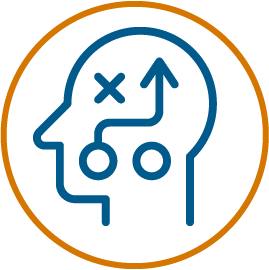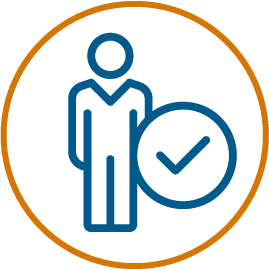Learn to assist young adults living with disabilities to lead more independent lives, and develop advocacy skills to influence state and national disability policies.
Program Type
Graduate Certificate
Semester Start
Fall
Study Options
Online
Minimum Duration
18 Months
UMass Boston’s Transition Leadership Certificate focuses on the transition from high school to adult life for young people with a wide range of disabilities. It’s designed for teachers and those with a master’s degree in Rehabilitation Counseling, School Guidance, School Adjustment Counseling related services staff, or School Social Work seeking a secondary license, as well as those seeking seeking initial licensure to work with special populations. Gain the skills necessary to focus on employment, college preparation, and independent living skills for students with disabilities, ages 14-22, as well as the leadership skills needed to help influence state and national policy around transition and disability. Upon completion of the program, you’ll be prepared to excel in a new role, that of a transition specialist, and find employment in secondary schools, transition programs, and college programs that support transition-aged students with disabilities.
The University of Massachusetts Boston Transition Leadership Program is an accredited transition specialist training program approved by the Division of Career Development and Transition of the Council for Exceptional Children and an approved program of study for the MA Department of Elementary and Secondary Education's Transition Specialist Endorsement. Individuals who have successfully completed this accredited DCDT transition preparation program are eligible to apply for a national DCDT transition specialist certification. Individuals in Massachusetts are also eligible to apply for the MA Department of Elementary and Secondary Education's Transition Specialist Endorsement.
The School for Global Inclusion and Social Development (SGISD) certificate in transition leadership meets the needs of professionals working in fields that require transition leadership skills, such as at a state agency or in an Inclusive Concurrent Enrollment program. The certificate program is an excellent way for educators and non-educators to broaden their abilities and to place their work in a wider context.
Tuition
- This program consists of five 3-credit courses and one 3-credit hands-on practicum requirement, or 18 credits.
- Online tuition is $575 per credit.
- Total estimated tuition cost to complete this program is $10,350.
- Estimate is based on completing program by minimum duration. Other fees may apply. Request Info to connect with a program representative for further details.
Deadline
- Applicants are accepted once a year, for the fall semester only. Application deadline is June 15.
Application Checklist
- Online Application
- Informational Webinar — Applicants meet with the program directors to learn about the certificate and determine their eligibility and interest in applying. Contact Program Coordinator Nancy Hurley to learn about the date(s) of the webinar: nancy.hurley@umb.edu, 857-385-9649.
- Transcripts — Official transcripts from all undergraduate and graduate institutions attended. A 3.0 undergraduate GPA is required.
- Two Letters of Recommendation — Letters should come from people who are knowledgeable about supporting students with disabilities, who have worked closely with you, and who have direct knowledge of your transition skills and academic performance.
- License Information — Submit documentation showing that you are an initially licensed special educator, school guidance counselor, school adjustment counselor, school social worker, related services staff, or vocational rehabilitation counselor.
- Statement of Interest and Intent (Required Writing Sample) — This sample should show your ability to write in a clear, concise, and professional manner. It may be in the form of a recent term paper. Please do NOT submit an Individualized Education Program (IEP) or evaluation report. We are seeking applicants who are thoughtful and responsive educators, committed to social justice. Your writing sample should demonstrate how you and your work match that description. An academic writing sample is required.
Submitting Materials: Most materials can be uploaded via your online application or sent to gadocs@umb.edu. Official transcripts and other correspondence can be sent via mail to the following address:
UMass Boston Graduate Admissions
100 Morrissey Boulevard
Boston, MA 02125
- Transition Topics Secondary Transition (SPE G 657)
Explore a variety of subjects that influence secondary transition for youth with a wide range of abilities and disabilities, such as evidence-based transition practices and trends, healthcare issues, mental health challenges, youth from diverse cultural and linguistic backgrounds, as well as specific challenges for transition-aged youth with intellectual and developmental disabilities. In addition to transition requirements and systems change, topics include family involvement in planning, interagency collaboration, social security and disability benefits, self-determination and guardianship, curriculum, transportation, and technology and accommodations. This course includes 15 hours of applied learning to assess district /program transition services and develop a strategic plan. - Youth Development & Self-Determination Secondary Transition (SPE G 654)
Study youth development and the importance of preparing youth to take the lead in their education, career development, and community participation. Upon completing this course, you’ll understand the principles of youth development and self-determination and be able to integrate these principles into your work with all youth. This course has 15 fieldwork hours intended to assist you to enable youth to create a vision for life after high school, create goals and objectives to meet that vision, and assume a leadership position in transition planning activities. - Career Development & Competitive Employment (SPE G 655)
Gain an overview of the career development process and a student-centered framework for career preparation. Course goals are based on career-related transition competencies, and are designed to help you assess students' career interests, use formal and informal career assessments, assist students to develop a course of study related to career interests, identify and assist students to engage in career exploration activities, incorporate connection activities into a student's career plan, and develop work-based learning opportunities. Field-based assignments involve identifying a focal person/student and using a student-centered approach to career development and planning in order to pave the way for integrated, competitive work experiences during and following high school. Throughout the course, you’ll hear from experts across the state whose focus is on career awareness and development for youth with and without disabilities. - Postsecondary Education for Students with Disabilities (SPE G 656)
Get an overview of postsecondary education options and the processes of applying for, enrolling in, and completing a postsecondary education course of study, using a person-centered framework. In particular, you’ll learn how important it is that youth with disabilities are better prepared for college, both academically and with self-determination skills, and what specific documentation of disabilities is needed to insure receiving appropriate accommodations from disability services on campus. You’ll work directly with a student with a disability who has expressed an interest in attending college as a bridge to integrated paid employment. Field-based assignments will involve a focal person interested in postsecondary education, who will be supported to develop an action plan, visit a college, and begin to compile an e-portfolio. - Transition Leadership (SPE G 658)
Explore training and sustainability activities required for transition education to be institutionalized in school districts across the Commonwealth. You’ll be equipped to take a lead in establishing up-to-date transition practices in your school district. To this end, you’ll learn how to develop and lead professional development workshops that demonstrate that the transition related needs of students with disabilities is a shared responsibility. Field-based assignments include presenting a series of transition-related, in-service workshops to educators and/or human services professionals and attending professional meetings for MA transition specialists and other transition stakeholders. - Practicum: Transition Leadership I (SPE G 693)
This seminar supports Transition Specialist (TS) candidates who are applying evidence-based transition policies and practices in school districts in a semester-long practica. You’ll focus on assignments supporting you as you work with and build the capacity of a school district to develop and sustain an interagency transition team that will support all transition-ages students with disabilities. You’ll meet every week, via web conferencing, to discuss both the successes and challenges of team creation and facilitation. Related activities include determining team membership, securing commitment from members to meet regularly, communicating the purpose of the team, establishing roles and responsibilities for all members, setting goals and deadlines, and evaluation the team's effectiveness in meeting its goals.
At the end of this 18-month program, you’ll be awarded a graduate certificate in Transition Leadership. The university will review your completed program of study and recommend qualified candidates to the MA Department of Secondary and Elementary Education for the Transition Specialist Endorsement. The endorsement will demonstrate your expertise in the field on your résumé, as well as in interviews and workplace evaluations.
Upon completion of the program, you’ll be prepared to work in a new and growing role, that of a transition specialist. Graduates of the transition leadership certificate program can expect to hone their skills and find employment opportunities in a variety of settings, such as school transition programs, college-based transition programs, vocational rehabilitation offices, and youth workforce centers.
Individuals who have successfully completed this accredited Division of Career Development and Transition (DCDT) transition preparation program are also eligible to apply for a national DCDT transition specialist certification. Individuals in Massachusetts are also eligible to apply for the MA Department of Elementary and Secondary Education's Transition Specialist Endorsement.
Why UMass Boston Online?
Value
Among the lowest online tuition rates of an accredited, public research university.
Flexibility
Study full-time to finish fast, or part-time to suit your schedule. Live sessions scheduled with the working professional in mind.
Authenticity
The same courses taught by the same academic departments as on campus. No third-party providers.
Learn More






